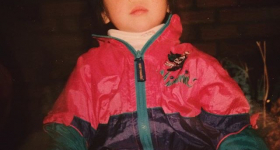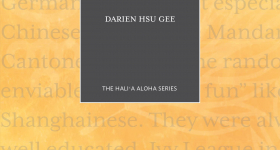Beheading fish is secondhand to my Grandpa. I watch him, crouched outside on the front lawn, send the silver-scaled head flying with one measured blow, a flashing blur in the sun. See, Yen Yen, this is how you do it. The blood soaks into the grass. I squat next to him, nodding with enough enthusiasm to topple my own skull off my bony shoulders. This is how you separate the body from the head.
///
Grandpa drafted a blueprint for the treehouse when the cold shut us in and curved our bodies around steaming dinner dishes. He started building it in the spring, 10 years after my birth flew him from Hong Kong to the suburbs of Chicago with Grandma. I watched him survey planks of wood in the garage and power-saw pieces off after carefully tracing and measuring each length and width.
My younger brother, who had wanted the treehouse last winter, sat inside watching reruns of Tom & Jerry with Grandma. I itched to yell at him but I didn’t want to leave my post. Liana, can I borrow your Nintendo. Liana, can I use your colored pencils. Liana, can you ask Grandpa what time we have to come over for dinner. I would pat him on the head, hold his smooth, unblemished cheek in my hand, and ask him why he couldn’t ask for himself. Because I don’t know how to say it in Chinese.
The hammer came down on the nails in beats of three — thump — a gush of air blew crabapples west — thump — the rain washed away the red stains — thump — I mirrored Grandpa with my own smaller, wooden hammer he made from scattered pieces used in past projects. I would send smashed crabapples flying in every direction in my pretend world, where I was making a special dish for the beady ants, who would swarm on my concoction the moment I extended my body up to the sky to stretch from a long, concentrated squat. I watched pieces of the treehouse start to come together with every stroke of Grandpa’s hammer. This is the floor. This is the door. There isn’t a roof because the leaves are so dense and you aren’t living in there anyway.
When the air started to chill we’d migrate indoors, done for the day. At first the treehouse didn’t appeal to me but I warmed up to it as it came to life. I started to crave creation. I’d dig my colored pencils out from under my books and folders, thankful to find their familiar fullness in my hands. I drew faces disproportionate to their bodies, eyes too detailed for a simple mouth, hands hidden behind dresses because they were too difficult to draw. One time, I found the largest piece of paper in the house and sat down to draw a mansion, complete with multiple floors, pets, and flowers. My face warmed with excitement or pride.
I showed Grandpa, who was watching the news with Grandma. He sat upright, thick oval glasses framing his sun-spotted face — a mirror to Grandma, who rested her back on the arm of the couch and let her body take up space. The news anchors spoke faster than I could understand. They both laughed when they saw my mansion. Grandpa pointed at the grand staircases. Do you think your dad would even buy that for you? My face burned again, but in shame. What I didn’t understand, other than the Chinese news, about what he really meant; what was never said but needed no translation: Do you know what I have built with my body?
He finished the treehouse by the time the sun made it unbearable to be outside. I clambered up the ladder with my brother, pushing him aside so I could go up first. Hey, be careful. Grandpa watched on the driveway. The inside was tiny — when my brother joined me we craned our bodies away from each other. Is it good? Are you having fun? I nodded, only 5 feet off the ground but feeling like I could touch the clouds and more. My brother and I endured the heat long enough to feel every crevice in our new playhouse before retreating indoors. I could tell Grandpa was happy by the smile that seemed to break his face in half.
We lived that summer in our treehouse. We spied on people walking their dogs, pretended to fight each other for territory. Grandpa watched us while he was sitting in a plastic chair on the driveway or quenching the thirsty grass or gutting another fish for dinner. Our neighbor, a delicate white girl with glasses too big for her face, came over to the treehouse some days. Sometimes she’d see Grandpa toss a glob of guts into a bucket. Somehow her eyes would widen enough to fit her glasses, mesmerized by my Grandpa’s placid gaze as he slammed the live fish on the sidewalk to knock it out. Wait until he cuts the head off, I’d say, barely containing my satisfaction at her predictable disgust. Of course she’d squirm and look away. I looked — I always looked. The knife glimmered.
Late summer showers started to strip the coating from the wooden planks until they peeled, as if sunburned. My brother and I didn’t fight as often to be the first one inside. Grandpa would coat the wood again when it dried, but the rain came again. He coated again. But nothing could hide the aging, and by the time leaves lined the treehouse floor we abandoned it for reruns inside with Grandma. Grandpa decided to deconstruct the wooden house one day deep into my first month of middle school. It’s getting dangerous, what if it falls apart? he said as he detached each piece as carefully as it was assembled, until a pile of dark wood littered the driveway. I knew I had outgrown it too.
The process wasn’t foreign to him. Grandpa had seen bigger buildings fall, had seen taller ones touch the sky. He had built them, after all. Stripped of any place to call home, he took the treehouse apart by hand, slab by slab, until the tree looked naked and started to grow more leaves to hide itself.
What I wanted to ask him if I knew how: no matter what you build, does anything really ever last here? He’d been running his whole life — first from China, then from Hong Kong. Later, he asks me a question I can’t answer: Who would want to leave their home unless they had no other choice?
Walking back home from school, I’d pass the tree that used to hold our treehouse, white flowers falling with every breath of air. I felt my body start to move away, but I didn't let myself forget the soft scent of spring. I let myself remember the small indentations — barely visible — marking the weight of what the branches carried. Soon, Grandpa would take a pair of shears and cut off the excess branches. He always knew how much to leave behind.
Photo courtesy of author.










Comments